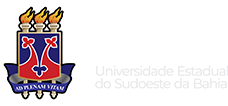Southwest Bahia State University (UESB) is a multi-campus institution with its headquarters in the city of Vitória da Conquista, located in the Central-Southern Mesoregion of the state of Bahia. Vitória da Conquista is the third-largest city in Bahia, with over 348,000 inhabitants, according to 2017 data from the Brazilian Institute of Geography and Statistics (IBGE).
UESB operates with two additional campuses: one in the city of Jequié, an important regional hub for commerce and services with a population of 162,209; and another in the city of Itapetinga, known as a prominent livestock center in the state, with a population of 77,533.
These subregions, comprising a group of municipalities, exhibit significant demographic dynamism and a relatively diversified rural economy (production of coffee, livestock, fruits and vegetables, and cocoa) alongside industrial activity and a significant range of services offered.
The emergence of UESB came about as a result of the State Government’s policy to expand higher education into the interior of Bahia, as outlined in the Integrated Education Plan of 1969. This plan led to the establishment of the Colleges of Education in the cities of Vitória da Conquista, Jequié, Feira de Santana, and Alagoinhas, in addition to the College of Agronomy of Médio São Francisco (FAMESF), which was established in the 1950s.
Until the mid-1960s, there were only two universities in the State and a few isolated higher education institutions. The State Government recognized the need for a comprehensive development policy for education at all levels. Thus, through the process of internalization, it aimed to organize higher education spatially in order to support the growing demand for qualified teachers at the primary and secondary levels, to encourage scientific research, and to foster a university culture in the interior regions.
In 1962, under Law No. 1,802 of October 25, the Colleges of Philosophy, Sciences, Language, and Arts were established in Vitória da Conquista, Jequié, Feira de Santana, Ilhéus, Caetité, and Juazeiro, in an effort to meet these demands. In 1969, the College of Education of Vitória da Conquista was founded by Federal Decree No. 21,363 of July 20. In the same year, under Law No. 2,741 of November 11, it was restructured as an autonomous entity. In 1970, by authorization of Law No. 2,852 of November 9, the Executive Branch founded the College of Education in Jequié, which was later designated as an autonomous institution by Decree No. 23,135/70.
The institutions became fully operational with the implementation of the undergraduate programs in Arts in Vitória da Conquista (1971), and Arts and Sciences in Jequié (1972), both in the form of short teaching degrees authorized by Federal Decrees No. 68,219 of February 11, 1971; No. 79,130 of January 17, 1977; and No. 80,551 of October 11, 1977, respectively. The recognition of these programs was granted through Federal Decree No. 79,252 of February 14, 1977 (Arts, in Vitória da Conquista), and Ministerial Order No. 37 of February 9, 1984 (Arts and Sciences, in Jequié).
The idea of establishing a university began to take shape in 1980. Law No. 3,799 of May 23 authorized the Executive Authority to establish a foundation with the purpose of “creating and maintaining a university in the southwestern region of the state.” The Southwest Educational Foundation was created by Decree No. 27,450 of August 12, 1980, with the goal of “implementing and maintaining a university in the Southwest by incorporating the assets and rights of the existing colleges in Vitória da Conquista and Jequié.”
Later in 1980, the Southwest Educational Foundation was dissolved as the University’s Governing body, through Delegated Law No. 12 of December 30, 1980, and replaced by Southwest Bahia State University (UESB) as an autonomous public institution. The university’s Implementation Regulations were approved by Decree No. 28,169 on August 25, 1981. Therefore, the College of Education, the College of Business Administration, and other future academic units were officially incorporated into UESB.
As part of the institution’s structural development, additional schools were founded: the School of Agronomy in Vitória da Conquista, the School of Animal Science in Itapetinga, and the School of Nursing in Jequié.
In early 1984, a partnership was formed between UESB and the Foundation for Support of Research and Extension (FAPEX), under the coordination of the Center for Interdisciplinary Studies for the Public Sector (ISP) at the Federal University of Bahia (UFBA). This collaboration produced a comprehensive proposal known as the “Letter of Consultation” (Carta Consulta). After two years of development, the document was submitted to the State Board of Education (CEE) to request authorization for UESB to operate as a multi-campus University under the jurisdiction of the State Secretariat of Education and Culture.
In the Technical Report of the CCE, No. 119/87, the Board issued a favorable assessment. Following this, the Federal Government issued Decree No. 94,250 of April 22, 1987, officially authorizing the operation of the university. UESB’s official accreditation was finalized in 1998 through Decree No. 7,344 of May 27, 1998, published in the Official Gazette of the State of Bahia on May 28, 1998.
In 2003, the university submitted a request for re-accreditation to the State Board of Education. The UESB was re-accredited for an eight-year period by Decree No. 9,996 of May 2, 2006.
In 2016, the University was once again re-accredited for an additional period of eight years, under Decree No. 16,825 of July 4, 2016, published in the Official Gazette on July 5, 2016. This re-accreditation reaffirmed the University’s institutional regularity and its commitment to educational quality across its three campuses, as well as its vital role in promoting regional development through Education, Research, and Community Outreach.


 Assessoria de Comunicação da UESB - tel:77 3424.8645
Assessoria de Comunicação da UESB - tel:77 3424.8645

